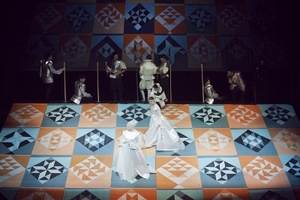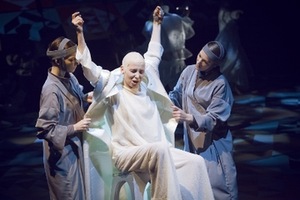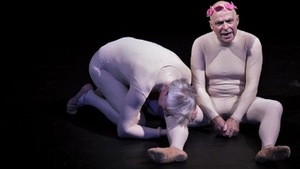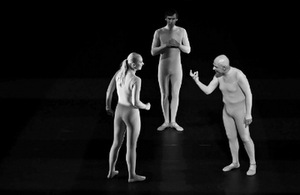How should classics be decontaminated? 3
In brief: Classics does not get old? You are joking, some educated spectator would say after watching two premieres of state theatres presented in Lithuania this autumn. The theatrical season started as usual this year – with time-tested classical works staged on big stages by well-known directors of elder generation who have passed tests of time. The author is speaking about the performance of Jonas Vaitkus “King Lear” presented at the Lithuanian Russian Drama Theatre modestly and met by critics enthusiastically and the performance “Barbora” of Jonas Jurašas which was advertised more but which has received rather little attention of critics by now.
Despite all well-meant motifs to choose these works, both performances appeared to pass the view of the contemporary spectator, they seemed to be stuck in time as islands trying to avoid dangerous draughts of stage. The author does not state that impact in theatre may be achieved only through drastic principles of contemporary art; still, it is hard not to agree that the adequacy of means to time, including the all-encompassing concept of the director, is vital to theatre as air.
By choosing “King Lear” of William Shakespeare, Jonas Vaitkus did think about the contemporary spectator for sure and planned tactical steps for this, which have already been evaluated by critics. By refusing all visual effects, Vaitkus conceptualised his solutions this time by ”melting” in actors, letting the empty space of the stage to them and leaving them alone to struggle with the feelings and dramas of their characters.
The trust of Vaitkus in the actors only and the text of Shakespeare is astounding but it hardly justifies. The acting is too theatrical, but the emotions of actors disperse without reaching the audience. As the actors perform abstract characters that are not related with specific time and space, their emotions appear behind of abstraction and do not touch the spectator.
While Vaitkus tried to search for unexpected solutions disclosing the classical text in ”King Lear”, the director Jonas Jurašas seems to have taken the most convenient, easiest way of romantic theatre usual to him while reviving the drama of Juozas Grušas, which made him prominent in 1972. The author speaks not only about the old-fashioned set design of modern style (Mindaugas Navakas), tastelessly stylised historical costumes (Jolanta Vazalinskienė), but also about the choice of theme. “Barbora” was presented not as a reconstruction of the historical play of Grušas but also as a performance about the Actress based on the dramatic adaptation of the text. It is natural that one hoped from a staging of Aušra Marija Sluckaitė that the fate line of the actress Rūta Staliliūnaitė would be revealed in the production.
Still, as the Actress does not have her independent story, it may hardly be said that the performance is about her. The impression appears that the personality of the Actress is only the pretext for Jurašas to return to the famous play, i.e. to speak about himself, to revive his own legend. It is not an adaptation of Grušas or a drama about the Actress. It is a performance about Jurašas, about his past and passing-away road.
The question arises whether our great directors have nothing to say to the contemporary viewer in fact or the present period and the showing contradictions of life are so uninteresting to them that they are not worth a thought? It seems in the discussed performances that the directors are interesting only to themselves.












